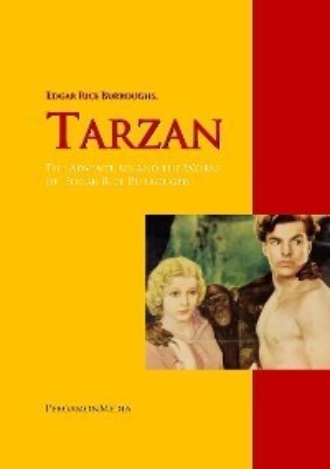
Полная версия
Tarzan: The Adventures and the Works of Edgar Rice Burroughs
He did not wish to return to camp without her father; still more, he shrank from the thought of leaving her alone and unprotected in the hands of the mutineers of the Arrow, or to the hundred unknown dangers of the jungle.
Possibly, too, he thought, the professor and Philander might have returned to camp. Yes, that was more than likely. At least he would return and see, before he continued what seemed to be a most fruitless quest. And so he started, stumbling back through the thick and matted underbrush in the direction that he thought the cabin lay.
To Tarzan's surprise the young man was heading further into the jungle in the general direction of Mbonga's village, and the shrewd young ape-man was convinced that he was lost.
To Tarzan this was scarcely comprehensible; his judgment told him that no man would venture toward the village of the cruel blacks armed only with a spear which, from the awkward way in which he carried it, was evidently an unaccustomed weapon to this white man. Nor was he following the trail of the old men. That, they had crossed and left long since, though it had been fresh and plain before Tarzan's eyes.
Tarzan was perplexed. The fierce jungle would make easy prey of this unprotected stranger in a very short time if he were not guided quickly to the beach.
Yes, there was Numa, the lion, even now, stalking the white man a dozen paces to the right.
Clayton heard the great body paralleling his course, and now there rose upon the evening air the beast's thunderous roar. The man stopped with upraised spear and faced the brush from which issued the awful sound. The shadows were deepening, darkness was settling in.
God! To die here alone, beneath the fangs of wild beasts; to be torn and rended; to feel the hot breath of the brute on his face as the great paw crushed down upon his breast!
For a moment all was still. Clayton stood rigid, with raised spear. Presently a faint rustling of the bush apprised him of the stealthy creeping of the thing behind. It was gathering for the spring. At last he saw it, not twenty feet away—the long, lithe, muscular body and tawny head of a huge black-maned lion.
The beast was upon its belly, moving forward very slowly. As its eyes met Clayton's it stopped, and deliberately, cautiously gathered its hind quarters behind it.
In agony the man watched, fearful to launch his spear, powerless to fly.
He heard a noise in the tree above him. Some new danger, he thought, but he dared not take his eyes from the yellow green orbs before him. There was a sharp twang as of a broken banjo-string, and at the same instant an arrow appeared in the yellow hide of the crouching lion.
With a roar of pain and anger the beast sprang; but, somehow, Clayton stumbled to one side, and as he turned again to face the infuriated king of beasts, he was appalled at the sight which confronted him. Almost simultaneously with the lion's turning to renew the attack a half-naked giant dropped from the tree above squarely on the brute's back.
With lightning speed an arm that was banded layers of iron muscle encircled the huge neck, and the great beast was raised from behind, roaring and pawing the air—raised as easily as Clayton would have lifted a pet dog.
The scene he witnessed there in the twilight depths of the African jungle was burned forever into the Englishman's brain.
The man before him was the embodiment of physical perfection and giant strength; yet it was not upon these he depended in his battle with the great cat, for mighty as were his muscles, they were as nothing by comparison with Numa's. To his agility, to his brain and to his long keen knife he owed his supremacy.
His right arm encircled the lion's neck, while the left hand plunged the knife time and again into the unprotected side behind the left shoulder. The infuriated beast, pulled up and backwards until he stood upon his hind legs, struggled impotently in this unnatural position.
Had the battle been of a few seconds' longer duration the outcome might have been different, but it was all accomplished so quickly that the lion had scarce time to recover from the confusion of its surprise ere it sank lifeless to the ground.
Then the strange figure which had vanquished it stood erect upon the carcass, and throwing back the wild and handsome head, gave out the fearsome cry which a few moments earlier had so startled Clayton.
Before him he saw the figure of a young man, naked except for a loin cloth and a few barbaric ornaments about arms and legs; on the breast a priceless diamond locket gleaming against a smooth brown skin.
The hunting knife had been returned to its homely sheath, and the man was gathering up his bow and quiver from where he had tossed them when he leaped to attack the lion.
Clayton spoke to the stranger in English, thanking him for his brave rescue and complimenting him on the wondrous strength and dexterity he had displayed, but the only answer was a steady stare and a faint shrug of the mighty shoulders, which might betoken either disparagement of the service rendered, or ignorance of Clayton's language.
When the bow and quiver had been slung to his back the wild man, for such Clayton now thought him, once more drew his knife and deftly carved a dozen large strips of meat from the lion's carcass. Then, squatting upon his haunches, he proceeded to eat, first motioning Clayton to join him.
The strong white teeth sank into the raw and dripping flesh in apparent relish of the meal, but Clayton could not bring himself to share the uncooked meat with his strange host; instead he watched him, and presently there dawned upon him the conviction that this was Tarzan of the Apes, whose notice he had seen posted upon the cabin door that morning.
If so he must speak English.
Again Clayton attempted speech with the ape-man; but the replies, now vocal, were in a strange tongue, which resembled the chattering of monkeys mingled with the growling of some wild beast.
No, this could not be Tarzan of the Apes, for it was very evident that he was an utter stranger to English.
When Tarzan had completed his repast he rose and, pointing a very different direction from that which Clayton had been pursuing, started off through the jungle toward the point he had indicated.
Clayton, bewildered and confused, hesitated to follow him, for he thought he was but being led more deeply into the mazes of the forest; but the ape-man, seeing him disinclined to follow, returned, and, grasping him by the coat, dragged him along until he was convinced that Clayton understood what was required of him. Then he left him to follow voluntarily.
The Englishman, finally concluding that he was a prisoner, saw no alternative open but to accompany his captor, and thus they traveled slowly through the jungle while the sable mantle of the impenetrable forest night fell about them, and the stealthy footfalls of padded paws mingled with the breaking of twigs and the wild calls of the savage life that Clayton felt closing in upon him.
Suddenly Clayton heard the faint report of a firearm—a single shot, and then silence.
In the cabin by the beach two thoroughly terrified women clung to each other as they crouched upon the low bench in the gathering darkness.
The Negress sobbed hysterically, bemoaning the evil day that had witnessed her departure from her dear Maryland, while the white girl, dry eyed and outwardly calm, was torn by inward fears and forebodings. She feared not more for herself than for the three men whom she knew to be wandering in the abysmal depths of the savage jungle, from which she now heard issuing the almost incessant shrieks and roars, barkings and growlings of its terrifying and fearsome denizens as they sought their prey.
And now there came the sound of a heavy body brushing against the side of the cabin. She could hear the great padded paws upon the ground outside. For an instant, all was silence; even the bedlam of the forest died to a faint murmur. Then she distinctly heard the beast outside sniffing at the door, not two feet from where she crouched. Instinctively the girl shuddered, and shrank closer to the black woman.
"Hush!" she whispered. "Hush, Esmeralda," for the woman's sobs and groans seemed to have attracted the thing that stalked there just beyond the thin wall.
A gentle scratching sound was heard on the door. The brute tried to force an entrance; but presently this ceased, and again she heard the great pads creeping stealthily around the cabin. Again they stopped—beneath the window on which the terrified eyes of the girl now glued themselves.
"God!" she murmured, for now, silhouetted against the moonlit sky beyond, she saw framed in the tiny square of the latticed window the head of a huge lioness. The gleaming eyes were fixed upon her in intent ferocity.
"Look, Esmeralda!" she whispered. "For God's sake, what shall we do? Look! Quick! The window!"
Esmeralda, cowering still closer to her mistress, took one frightened glance toward the little square of moonlight, just as the lioness emitted a low, savage snarl.
The sight that met the poor woman's eyes was too much for the already overstrung nerves.
"Oh, Gaberelle!" she shrieked, and slid to the floor an inert and senseless mass.
For what seemed an eternity the great brute stood with its forepaws upon the sill, glaring into the little room. Presently it tried the strength of the lattice with its great talons.
The girl had almost ceased to breathe, when, to her relief, the head disappeared and she heard the brute's footsteps leaving the window. But now they came to the door again, and once more the scratching commenced; this time with increasing force until the great beast was tearing at the massive panels in a perfect frenzy of eagerness to seize its defenseless victims.
Could Jane have known the immense strength of that door, built piece by piece, she would have felt less fear of the lioness reaching her by this avenue.
Little did John Clayton imagine when he fashioned that crude but mighty portal that one day, twenty years later, it would shield a fair American girl, then unborn, from the teeth and talons of a man-eater.
For fully twenty minutes the brute alternately sniffed and tore at the door, occasionally giving voice to a wild, savage cry of baffled rage. At length, however, she gave up the attempt, and Jane heard her returning toward the window, beneath which she paused for an instant, and then launched her great weight against the timeworn lattice.
The girl heard the wooden rods groan beneath the impact; but they held, and the huge body dropped back to the ground below.
Again and again the lioness repeated these tactics, until finally the horrified prisoner within saw a portion of the lattice give way, and in an instant one great paw and the head of the animal were thrust within the room.
Slowly the powerful neck and shoulders spread the bars apart, and the lithe body protruded farther and farther into the room.
As in a trance, the girl rose, her hand upon her breast, wide eyes staring horror-stricken into the snarling face of the beast scarce ten feet from her. At her feet lay the prostrate form of the Negress. If she could but arouse her, their combined efforts might possibly avail to beat back the fierce and bloodthirsty intruder.
Jane stooped to grasp the black woman by the shoulder. Roughly she shook her.
"Esmeralda! Esmeralda!" she cried. "Help me, or we are lost."
Esmeralda opened her eyes. The first object they encountered was the dripping fangs of the hungry lioness.
With a horrified scream the poor woman rose to her hands and knees, and in this position scurried across the room, shrieking: "O Gaberelle! O Gaberelle!" at the top of her lungs.
Esmeralda weighed some two hundred and eighty pounds, and her extreme haste, added to her extreme corpulency, produced a most amazing result when Esmeralda elected to travel on all fours.
For a moment the lioness remained quiet with intense gaze directed upon the flitting Esmeralda, whose goal appeared to be the cupboard, into which she attempted to propel her huge bulk; but as the shelves were but nine or ten inches apart, she only succeeded in getting her head in; whereupon, with a final screech, which paled the jungle noises into insignificance, she fainted once again.
With the subsidence of Esmeralda the lioness renewed her efforts to wriggle her huge bulk through the weakening lattice.
The girl, standing pale and rigid against the farther wall, sought with ever-increasing terror for some loophole of escape. Suddenly her hand, tight-pressed against her bosom, felt the hard outline of the revolver that Clayton had left with her earlier in the day.
Quickly she snatched it from its hiding-place, and, leveling it full at the lioness's face, pulled the trigger.
There was a flash of flame, the roar of the discharge, and an answering roar of pain and anger from the beast.
Jane Porter saw the great form disappear from the window, and then she, too, fainted, the revolver falling at her side.
But Sabor was not killed. The bullet had but inflicted a painful wound in one of the great shoulders. It was the surprise at the blinding flash and the deafening roar that had caused her hasty but temporary retreat.
In another instant she was back at the lattice, and with renewed fury was clawing at the aperture, but with lessened effect, since the wounded member was almost useless.
She saw her prey—the two women—lying senseless upon the floor. There was no longer any resistance to be overcome. Her meat lay before her, and Sabor had only to worm her way through the lattice to claim it.
Slowly she forced her great bulk, inch by inch, through the opening. Now her head was through, now one great forearm and shoulder.
Carefully she drew up the wounded member to insinuate it gently beyond the tight pressing bars.
A moment more and both shoulders through, the long, sinuous body and the narrow hips would glide quickly after.
It was on this sight that Jane Porter again opened her eyes.
Chapter XV
The Forest God
When Clayton heard the report of the firearm he fell into an agony of fear and apprehension. He knew that one of the sailors might be the author of it; but the fact that he had left the revolver with Jane, together with the overwrought condition of his nerves, made him morbidly positive that she was threatened with some great danger. Perhaps even now she was attempting to defend herself against some savage man or beast.
What were the thoughts of his strange captor or guide Clayton could only vaguely conjecture; but that he had heard the shot, and was in some manner affected by it was quite evident, for he quickened his pace so appreciably that Clayton, stumbling blindly in his wake, was down a dozen times in as many minutes in a vain effort to keep pace with him, and soon was left hopelessly behind.
Fearing that he would again be irretrievably lost, he called aloud to the wild man ahead of him, and in a moment had the satisfaction of seeing him drop lightly to his side from the branches above.
For a moment Tarzan looked at the young man closely, as though undecided as to just what was best to do; then, stooping down before Clayton, he motioned him to grasp him about the neck, and, with the white man upon his back, Tarzan took to the trees.
The next few minutes the young Englishman never forgot. High into bending and swaying branches he was borne with what seemed to him incredible swiftness, while Tarzan chafed at the slowness of his progress.
From one lofty branch the agile creature swung with Clayton through a dizzy arc to a neighboring tree; then for a hundred yards maybe the sure feet threaded a maze of interwoven limbs, balancing like a tightrope walker high above the black depths of verdure beneath.
From the first sensation of chilling fear Clayton passed to one of keen admiration and envy of those giant muscles and that wondrous instinct or knowledge which guided this forest god through the inky blackness of the night as easily and safely as Clayton would have strolled a London street at high noon.
Occasionally they would enter a spot where the foliage above was less dense, and the bright rays of the moon lit up before Clayton's wondering eyes the strange path they were traversing.
At such times the man fairly caught his breath at sight of the horrid depths below them, for Tarzan took the easiest way, which often led over a hundred feet above the earth.
And yet with all his seeming speed, Tarzan was in reality feeling his way with comparative slowness, searching constantly for limbs of adequate strength for the maintenance of this double weight.
Presently they came to the clearing before the beach. Tarzan's quick ears had heard the strange sounds of Sabor's efforts to force her way through the lattice, and it seemed to Clayton that they dropped a straight hundred feet to earth, so quickly did Tarzan descend. Yet when they struck the ground it was with scarce a jar; and as Clayton released his hold on the ape-man he saw him dart like a squirrel for the opposite side of the cabin.
The Englishman sprang quickly after him just in time to see the hind quarters of some huge animal about to disappear through the window of the cabin.
As Jane opened her eyes to a realization of the imminent peril which threatened her, her brave young heart gave up at last its final vestige of hope. But then to her surprise she saw the huge animal being slowly drawn back through the window, and in the moonlight beyond she saw the heads and shoulders of two men.
As Clayton rounded the corner of the cabin to behold the animal disappearing within, it was also to see the ape-man seize the long tail in both hands, and, bracing himself with his feet against the side of the cabin, throw all his mighty strength into the effort to draw the beast out of the interior.
Clayton was quick to lend a hand, but the ape-man jabbered to him in a commanding and peremptory tone something which Clayton knew to be orders, though he could not understand them.
At last, under their combined efforts, the great body was slowly dragged farther and farther outside the window, and then there came to Clayton's mind a dawning conception of the rash bravery of his companion's act.
For a naked man to drag a shrieking, clawing man-eater forth from a window by the tail to save a strange white girl, was indeed the last word in heroism.
Insofar as Clayton was concerned it was a very different matter, since the girl was not only of his own kind and race, but was the one woman in all the world whom he loved.
Though he knew that the lioness would make short work of both of them, he pulled with a will to keep it from Jane Porter. And then he recalled the battle between this man and the great, black-maned lion which he had witnessed a short time before, and he commenced to feel more assurance.
Tarzan was still issuing orders which Clayton could not understand.
He was trying to tell the stupid white man to plunge his poisoned arrows into Sabor's back and sides, and to reach the savage heart with the long, thin hunting knife that hung at Tarzan's hip; but the man would not understand, and Tarzan did not dare release his hold to do the things himself, for he knew that the puny white man never could hold mighty Sabor alone, for an instant.
Slowly the lioness was emerging from the window. At last her shoulders were out.
And then Clayton saw an incredible thing. Tarzan, racking his brains for some means to cope single-handed with the infuriated beast, had suddenly recalled his battle with Terkoz; and as the great shoulders came clear of the window, so that the lioness hung upon the sill only by her forepaws, Tarzan suddenly released his hold upon the brute.
With the quickness of a striking rattler he launched himself full upon Sabor's back, his strong young arms seeking and gaining a full-Nelson upon the beast, as he had learned it that other day during his bloody, wrestling victory over Terkoz.
With a roar the lioness turned completely over upon her back, falling full upon her enemy; but the black-haired giant only closed tighter his hold.
Pawing and tearing at earth and air, Sabor rolled and threw herself this way and that in an effort to dislodge this strange antagonist; but ever tighter and tighter drew the iron bands that were forcing her head lower and lower upon her tawny breast.
Higher crept the steel forearms of the ape-man about the back of Sabor's neck. Weaker and weaker became the lioness's efforts.
At last Clayton saw the immense muscles of Tarzan's shoulders and biceps leap into corded knots beneath the silver moonlight. There was a long sustained and supreme effort on the ape-man's part—and the vertebrae of Sabor's neck parted with a sharp snap.
In an instant Tarzan was upon his feet, and for the second time that day Clayton heard the bull ape's savage roar of victory. Then he heard Jane's agonized cry:
"Cecil—Mr. Clayton! Oh, what is it? What is it?"
Running quickly to the cabin door, Clayton called out that all was right, and shouted to her to open the door. As quickly as she could she raised the great bar and fairly dragged Clayton within.
"What was that awful noise?" she whispered, shrinking close to him.
"It was the cry of the kill from the throat of the man who has just saved your life, Miss Porter. Wait, I will fetch him so you may thank him."
The frightened girl would not be left alone, so she accompanied Clayton to the side of the cabin where lay the dead body of the lioness.
Tarzan of the Apes was gone.
Clayton called several times, but there was no reply, and so the two returned to the greater safety of the interior.
"What a frightful sound!" cried Jane, "I shudder at the mere thought of it. Do not tell me that a human throat voiced that hideous and fearsome shriek."
"But it did, Miss Porter," replied Clayton; "or at least if not a human throat that of a forest god."
And then he told her of his experiences with this strange creature—of how twice the wild man had saved his life—of the wondrous strength, and agility, and bravery—of the brown skin and the handsome face.
"I cannot make it out at all," he concluded. "At first I thought he might be Tarzan of the Apes; but he neither speaks nor understands English, so that theory is untenable."
"Well, whatever he may be," cried the girl, "we owe him our lives, and may God bless him and keep him in safety in his wild and savage jungle!"
"Amen," said Clayton, fervently.
"For the good Lord's sake, ain't I dead?"
The two turned to see Esmeralda sitting upright upon the floor, her great eyes rolling from side to side as though she could not believe their testimony as to her whereabouts.
And now, for Jane Porter, the reaction came, and she threw herself upon the bench, sobbing with hysterical laughter.
Chapter XVI
"Most Remarkable"
Several miles south of the cabin, upon a strip of sandy beach, stood two old men, arguing.
Before them stretched the broad Atlantic. At their backs was the Dark Continent. Close around them loomed the impenetrable blackness of the jungle.
Savage beasts roared and growled; noises, hideous and weird, assailed their ears. They had wandered for miles in search of their camp, but always in the wrong direction. They were as hopelessly lost as though they suddenly had been transported to another world.
At such a time, indeed, every fiber of their combined intellects must have been concentrated upon the vital question of the minute—the life-and-death question to them of retracing their steps to camp.
Samuel T. Philander was speaking.
"But, my dear professor," he was saying, "I still maintain that but for the victories of Ferdinand and Isabella over the fifteenth-century Moors in Spain the world would be today a thousand years in advance of where we now find ourselves. The Moors were essentially a tolerant, broad-minded, liberal race of agriculturists, artisans and merchants—the very type of people that has made possible such civilization as we find today in America and Europe—while the Spaniards—"
"Tut, tut, dear Mr. Philander," interrupted Professor Porter; "their religion positively precluded the possibilities you suggest. Moslemism was, is, and always will be, a blight on that scientific progress which has marked—"






